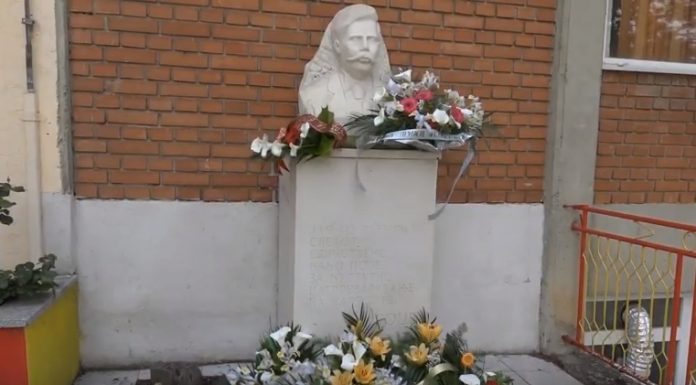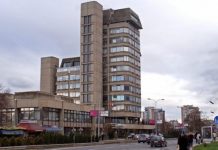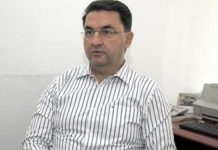The forming of Macedonian-Bulgarian Joint Committee on Historical and Educational Affairs is a political act and aims at “denationalizing and depoliticizing the past” of our country. The stumbling block is the personality of Goce Delcev who marked the epoch in the recent history of Macedonia, the Macedonian people and the Macedonian nation, was highlighted at today’s scientific forum in Skopje on the topic “Life and Work of Goce Delcev in the Collective Memory of the Macedonian People” attended by several Macedonian historians.
Prof. Dr. Mihajlo Minovski emphasized that Goce Delcev is only Macedonian, and our historical past was and is only Macedonian. The Government of the Republic of Macedonia, by signing the agreements with Bulgaria on 1 August 2017 and with Greece on 17 June 2018, declared null and void all the values and achievements of the Macedonian modern historical science, of generations of our scholars, professors and academics, such as Ljuben Lape, Blaze Koneski, Aleksandar Hristov, etc.
– The government has documented to both parties that for the past seven and a half decades our historical science has been stealing someone else’s history and creating false Macedonian history. With the Treaty with Bulgaria and with the Agreement with Greece, the Government undertook to rectify the historical injustices inflicted, to restore the appropriated “Bulgarian” of Bulgaria, the “Hellenic” of Greece. It implemented amendment of the Constitution to erase the constitutional name, and thus the historical and state continuity of the Republic of Macedonia, continues with the de-Macedonianisation of our millennial historical, political and cultural past, says Minovski.
According to him, under the formulation of a common past with the Bulgarian people it was Bulgarianized, so the holy brothers Cyril and Methodius, Clement and Naum were Bulgarians, the medieval Macedonian state of Samoil’s kingdom was Bulgarian, all Macedonian rebels and revolutionaries were Bulgarians, occupying Macedonia. The Balkan and the two world wars were not occupation but liberation. There is no Pirin part of Macedonia in Bulgaria, no Macedonians, no Macedonian national minority. With the second agreement, the Government accepted and confirmed that the seaside part of Macedonia has always been and is Greek, that there were no Macedonians, that there was no Macedonian national minority in the Greek state. Minovski pointed out that the two national committees to enforce the treaties have engaged historians to testify to the historical basis of what has already been accepted.
– In both cases they are there to testify that our science has made history for both peoples both Bulgarian and Greek. In the case of Bulgaria, their agreements on Goce Delcev as to whether he was a Bulgarian or a shared historical figure are at a standstill. Today, day before the Delcev’s birth anniversary, we discover Goce Delcev as a person who marked the epoch in the recent history of Macedonia, the Macedonian people and the Macedonian nation. We define his epochal work in terms of the time ahead, says historian Minovski.
Historian Todor Cepreganov refers to political interference in history, which he says is aimed at contributing to good neighborly relations. Cepreganov thinks that the Joint Macedonian-Bulgarian Expert Committee established after the signing of the Agreement with Bulgaria aims to “denationalize and depoliticize the past” and to reconcile attitudes such that parts of history in textbooks are presented in a way that is not irrevocable for no one and in that context set aside dates for mutual celebration.
– So far, the Commission has proposed St. Cyril and Methodius, Grigor Prlicev, Sv. Naum and King Samuel. However, a source of stumbling blocks in the work of the commissions came when the Bulgarian side voiced a demand to accept that Goce Delcev was a Bulgarian that the Macedonian members of the Commission did not accept, and suggested a day of joint commemoration to be the relocation of Delcev’s relics from Sofia to the capital. of the then People’s Republic of Macedonia which was not accepted by the Bulgarian side. Undoubtedly, the “haggling” over dates, figures and events in Macedonian history will continue, given that these are politically formulated ones that must yield results, and political decisions in this case must be confirmed by scholars with the excuse that politics has had no part in it. all that, said Professor Cepreganov.
Professor Nikola Zezov said that the citizens of the country call the historians silent, which, according to him, is partially true for some of them. But, he added, some of them opposed signing the Treaty with Bulgaria before it happened and read their names on the initiative they submitted then.
The scientific forum is organized by the Socialist Party of Macedonia and is provoked by what the party says, the current developments inside and outside the country and the worrying processes and phenomena that occur after the signing of the good neighborly relations and cooperation agreements with Bulgaria and with Greece.



